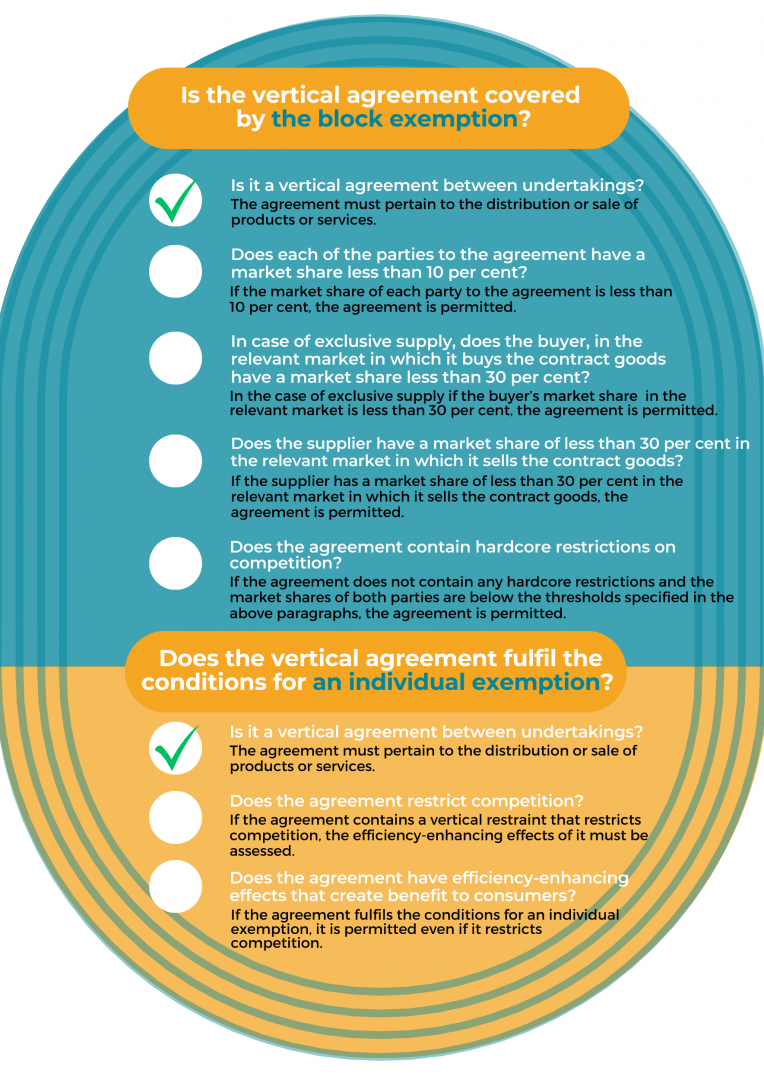Pursuant to Section 11 of the Latvian Competition Law (CL), agreements between undertakings that have as their object or effect the prevention, restriction or distortion of competition in the territory of Latvia are prohibited and null and void from the moment of being entered into, including agreements concerning, for example, the determination or fixing of resale prices or the allocation of markets or customers. The most common restrictions of competition are set out in the law, but in the context of vertical agreements, the assessment of whether a particular vertical agreement restricts competition will need to be assessed by reference to the specific circumstances, such as the relevant market and the nature of the restriction in question.
Vertical agreements often provide benefits to undertakings and consumers as well as competition, but they can also be used to restrict competition, which is prohibited under competition law.
- What is a vertical agreement?
- When is a vertical agreement permitted?
- When is a vertical agreement prohibited?
- Self-assessment checklist
- Legal framework and other useful sources
What is a vertical agreement?
A vertical agreement is a contract or concerted practice between two or more undertakings, each of whom performs its economic activities at a different level of production or distribution, and which is related to purchasing or selling provisions of the contract goods. Contract goods are products or services which are the subject of the vertical agreement. Vertical agreements are most often supply and distribution contracts used by the undertakings to agree on specific terms and conditions with respect to the purchase, sale or resale of goods or services. Vertical agreements are therefore different from agreements between direct competitors operating in the same market or at the same level of the market, i.e. horizontal agreements.
The purpose of the competition rules is to prevent undertakings from using their vertical agreements to restrict competition in a way that is detrimental to consumers. A prerequisite to be observed by each and every undertaking is that the decisions of the undertaking must be taken independently, for example, regarding the price at which the buyer sells the product or service to the end consumer.
Terms and conditions that restrict competition may not be applied or enforced. Each undertaking is responsible for ensuring that its vertical agreements do not restrict competition. Therefore, undertakings must be able to determine when their vertical agreements are permitted and when they fall within the scope of the prohibitions laid down in the competition rules (Section 11 of the CL).
Latvian Competition Law (Section 11 of the CL) is interpreted in accordance with Article 101 of the Treaty on the Functioning of the European Union (TFEU). The operation of the TFEU in relation to vertical agreements is further clarified in Commission Regulation (EU) 2022/720 of 10 May 2022 on the application of Article 101(3) of the Treaty on the Functioning of the European Union to categories of vertical agreements and concerted practices categories and the European Commission (EC) Guidelines on vertical restraints. Vertical agreements that restrict competition only within the territory of Latvia and do not restrict trade between Member States are subject to Cabinet Regulation No. 797 Regulations Regarding Non-subjection of Certain Vertical Agreements to the Prohibition of the Agreement Specified in Section 11, paragraph one of the Competition Law.
The applicable Cabinet Regulation No. 797 is being revised in line with the requirements laid down in EC Regulation 2022/720. The information below is in accordance with the currently applicable Cabinet Regulation No. 797.
When is a vertical agreement permitted?
The competition rules (i.e. Section 11 of the CL) apply in any case to vertical agreements between undertakings if such agreements contain hardcore restrictions or otherwise significantly restrict competition. Competition rules do not apply to vertical agreements that do not restrict competition, if the vertical agreement:
- Falls within the scope of the block exemption
Vertical agreements harm competition only if there is insufficient competition at one of the levels of the supply chain. Vertical agreements are subject to the so-called block exemption set out in Cabinet Regulation No. 797 if the conditions set out therein are met. If a vertical agreement provides benefit to consumers and does not significantly distort competition, an exemption from the prohibition applies, in accordance with Cabinet Regulation No. 797.
A vertical agreement between two or more undertakings is normally covered by the block exemption and therefore permitted in the following situations:



